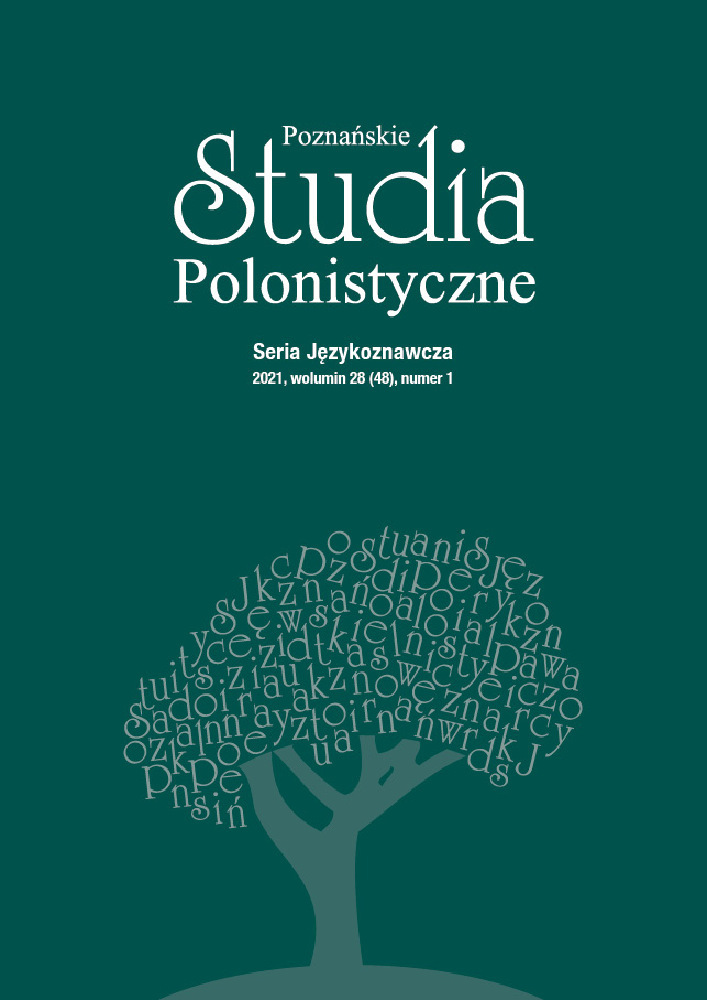Abstract
The article discusses Polish-Latin bilingualism of Polish medieval legal texts and its impact on the shaping of the official language variant. The article presents constructions that, in their own structure of court oath, include a form of set and often repeated formulas. These are: the formula of initial oath (Tako mi pomoży Bog i święty krzyż [so help me God and the holy cross]) and the comparative construction indicating the membership of a social class of the participants of the events (tako dobry jako sam [as good as himself]) or the material value (tako dobry jako [as good as]). These constructions would appear in the Polish text in Latin, both in full or shortened form, or they would be part in Polish, part in Latin. The stable form of constructions that appeared in Latin as calques due to the influence of Polish indicates that they became, as a result of the domination of the Latin template, vivid markers of the official style in medieval Polish.
References
Źródła (wraz ze stosowanymi skrótami)
Wielkopolskie roty sądowe XIV–XV wieku, zebrali i opracowali Henryk Kowalewicz, Władysław Kuraszkiewicz:
GN – t. 5: A. Roty gnieźnieńskie, Wrocław 1981.
K – t. 3: Roty kościańskie, Wrocław 1967.
KA – t. 4: Roty kaliskie, Wrocław 1974.
KN – t. 5: B. Roty konińskie, Wrocław 1981.
P – t. 1: Roty poznańskie, Poznań–Wrocław 1959.
PY – t. 2: Roty pyzdrskie, Warszawa 1960.
Literatura
Arabski Janusz (2007), Transfer międzyjęzykowy, w: Psychologiczne aspekty dwuję¬zyczności, red. Ida Kurcz, Gdańsk, s. 341–351.
Hube Romuald (1888), Zbiór rot przysiąg sadowych poznańskich, kościańskich, kali¬skich, sieradzkich, piotrkowskich i dobrzyszyckich z końca wieku XIV i pierwszych lat wieku XV, Warszawa.
Klemensiewicz Zenon (1999), Historia języka polskiego, wyd. 7, Warszawa.
Krążyńska Zdzisława, Mika Tomasz, Słoboda Agnieszka (2015), Składnia średnio¬wiecznej polszczyzny. Konteksty – metody – tendencje, Poznań.
Kuraszkiewicz Władysław (1986), Formuły przysięgi w rotach sądowych XIV– –XVI wieku, w: tenże, Polski język literacki. Studia nad historią i strukturą, War¬szawa, s. 579–587.
Kuźmicki Marcin (2013), Współistnienie języków w rotach przysiąg sądowych, „Slavia Occidentalis”, nr 70, z. 1, s. 75–86.
Mika Tomasz (2012), „Kazania świętokrzyskie” – od rękopisu do zrozumienia tekstu, Poznań.
Piekosiński Franciszek (1902), Wybór zapisek sądowych grodzkich i ziemskich wiel¬kopolskich z XV wieku, Kraków.
Schendl Herbert (2000a), Linguistic Aspects of Code-Switching in Medieval English Texts, w: Multilingualism in Later Medieval Britain, red. DavidTrotter, Cambridge, s. 77–92.
Schendl Herbert (2000b), Syntactic constraints on code-switching in medieval texts, w: Placing Middle English in Context, red. Irma Taavitsainen i in., Berlin, s. 67–86.
Słoboda Agnieszka (2003), Liczebniki zespołowe w wielkopolskich rotach sądowych, „Poznańskie Studia Polonistyczne. Seria Językoznawcza”, t. 10, s. 229–241.
Słoboda Agnieszka (2004), O braku pewnego przyimka, w: Studia Językoznawcze, t. 3, red. Mirosława Białoskórska, Szczecin, s. 335–345.
Słoboda Agnieszka (2005), Składnia grupy imiennej w staropolszczyźnie. Na przykła¬dzie wielkopolskich rot sądowych XIV i XV wieku, Poznań.
Słoboda Agnieszka (2014), Oddziaływanie łaciny i czeszczyzny na składnię liczebników w średniowiecznej polszczyźnie, „Prace Filologiczne”, t. 65, s. 385–400.
Trawińska Maria (2009), Indeksy do wielkopolskich rot sądowych z XIV i XV wieku, Warszawa.
Weyssenhoff-Brożkowa Krystyna (1991), Wpływ polszczyzny na łacinę średniowieczną w Polsce, Kraków.
License
Authors
The Author declares that they are entitled to personal and property (material) copyrights to their work published in “Poznańskie Studia Polonistyczne. Seria Językoznawcza”, and that these rights are not limited by the terms of Author’s agreement. The Author warrants the originality, authorship, and sole ownership of all rights to the Work, and affirms that they have the right to grant all kinds of licenses hereinabove without infringing on the intellectual property rights of any third party, including personal rights.
The Author(s) retains copyright to their article and the right to freely dispose of the work, granting Adam Mickiewicz University in Poznań a non-exclusive, royalty-free licence under the Attribution-NoDerivatives 4.0 International (CC BY-ND 4.0) Creative Commons licence to use the Work without territorial restrictions for an indefinite period in the fields of use designated in the Author’s agreement.
Users
Interested Internet users are entitled to use works published in „Poznańskie Studia Polonistyczne. Seria Językoznawcza” since 2016 under the following conditions:
- attribution - obligation to provide, together with the distributed work, information about the authorship, title, source (link to the original work, DOI) and the license itself.
- no derivatives - the work must be preserved in its original form, without the author's consent it is not possible to distribute the modified work, such as translations, publications, etc.
Copyrights are reserved for all texts published before 2016.
Other
Adam Mickiewicz University in Poznań retains the right to the journal as a whole (including its layout, graphic design, title, cover design, logo and more).

